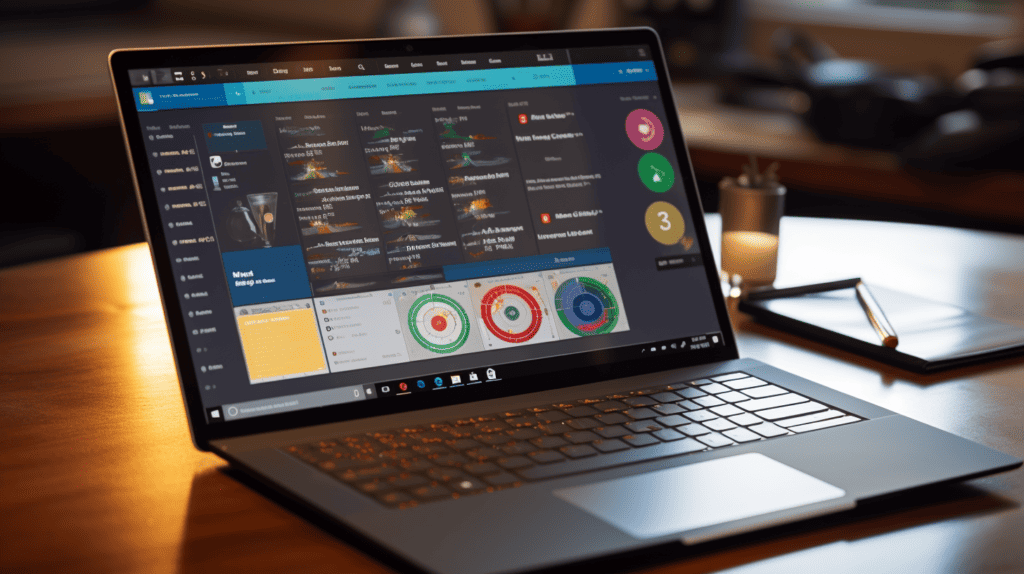As a college student, managing your time effectively can make all the difference in achieving your goals and reducing stress levels. However, with the multitude of responsibilities that come with college life, time management can often be a challenge. Balancing academics, work, and social life can make it seem impossible to get everything done in a day.
That’s why it’s essential for college students to master time management skills. In this article, I will share techniques and strategies to help you manage your time effectively, overcome common challenges, and achieve success.
Key Takeaways:
- Time management is crucial for college students to achieve success and reduce stress levels.
- Balancing academics, work, and social life can make time management a challenge.
- Effective time management skills can be learned and mastered through techniques and strategies.
Time Management Lesson Plans for College Students Resource:
- https://www.purdue.edu/stepstoleaps/resources/learn/well-being/time-management.php
- https://www.wvsd208.org/assets/pdfs/Lesson-Plan-Time-Management.pdf
- https://www.overcomingobstacles.org/uploads/images/blog/uploads/2019/06/Managing-Your-Time.pdf
The Benefits of Effective Time Management
As a college student, managing your time effectively is crucial to achieving success in all aspects of your life. Effective time management skills can help you to improve your academic performance, reduce stress levels, increase productivity, and maintain a healthy work-life balance.
When you have control over your time, you can allocate it wisely to focus on the tasks that are important to you. This allows you to be more productive and achieve your goals more efficiently. By prioritizing tasks and managing your time effectively, you can also reduce stress levels and create more time for self-care and relaxation.
Effective time management skills can also help you to maintain a healthy work-life balance. By allocating time for work, studying, and leisure activities, you can ensure that you have time for the things that matter most to you. This can reduce burnout and improve your overall well-being.
In summary, developing effective time management skills can be the key to success in college. By taking control of your time and using it wisely, you can achieve better academic performance, reduced stress levels, increased productivity, and a healthy work-life balance.
Techniques for Time Management
Effective time management requires specific techniques and strategies that can help college students prioritize tasks and make the most of their time. Here are some key techniques for successful time management:
- Create a schedule: Developing a schedule can help you keep track of your time and prioritize tasks. You can use a planner, calendar, or digital organizer to create a schedule that works best for you.
- Identify priorities: Recognize which tasks are most important and need to be completed first. Focusing on important tasks will help you avoid wasting time on less essential tasks.
- Break tasks down: Divide larger tasks into smaller, more manageable ones. This can help you stay motivated and avoid feeling overwhelmed.
- Set goals: Clearly defining your goals will help you stay focused and motivated. You can break down larger goals into smaller achievable ones for more effective time management.
- Avoid procrastination: Break the habit of putting off tasks until the last minute, which can cause stress and poor time management. Instead, try to complete tasks as soon as possible or schedule specific times to work on them.
- Use time-saving tools: Take advantage of various apps and software that can save time and increase productivity. Choose from a wide range of tools that help with task management, note-taking, and time tracking.
By incorporating these techniques into your daily routine, you can manage your time effectively and achieve your goals efficiently.

Creating a Time Management Plan
Now that you have learned some effective time management techniques, it’s time to create a personalized plan that works for you. The first step is to set realistic and achievable goals that align with your priorities and values. This will help you stay focused and motivated throughout the day.
Next, create a schedule that includes all your activities, including classes, work, and personal commitments. You can use a planner or digital organizer to help you keep track of your tasks and deadlines.
When creating your schedule, make sure to allocate enough time for each task and include breaks in between to give your brain a rest. It’s also a good idea to tackle the most important tasks during your peak productivity hours.
| Goal | Priority | Time Allocation |
|---|---|---|
| Study for Biology Exam | High | 3 hours |
| Complete English Essay | Medium | 2 hours |
| Attend Club Meeting | Low | 1 hour |
Remember, it’s important to be flexible and adjust your plan as needed. Unexpected events can arise, and it’s essential to have the flexibility to handle them without completely derailing your schedule.
Finally, commit to sticking to your plan and holding yourself accountable. If you find yourself struggling, consider seeking support from a peer or mentor who can help you stay on track and motivated.
Managing Distractions
As a college student, distractions can come in many forms, from your phone buzzing with notifications to social media feeds to friends dropping by unannounced. These distractions can completely throw off your focus, productivity, and time management efforts.
One key technique for managing distractions is to practice self-discipline. This means setting boundaries for yourself and sticking to them. For example, you could turn off your phone or put it on silent mode while studying or working on important tasks. You could also set specific times for checking your email, social media, and other non-urgent notifications.
Another effective way to manage distractions is to create a conducive study environment. This can include finding a quiet and comfortable place to work, minimizing noise and interruptions, and setting up your work area with the necessary tools and materials.
While it can be tempting to take frequent breaks or engage in non-productive activities, remember that managing your time effectively requires discipline and focus. Stay motivated and committed to your goals, and you’ll find that you’re able to overcome distractions and achieve more in less time.

Time Management Tools and Apps
Managing time effectively can be a real challenge, but luckily there are plenty of tools and apps available to help you stay organized and on track. Here are some of my favorite time management tools and apps:
| Tool or App | Description |
|---|---|
| Google Calendar | A free online calendar that syncs across all your devices and allows you to schedule reminders, invite others to events, and color-code your schedule for easy viewing. |
| Trello | A project management app that lets you create and organize tasks on a virtual board, add due dates, and collaborate with others in real-time. |
| Pomodoro Timer | An app that uses the Pomodoro method, a time management technique that involves working for 25 minutes, then taking a 5-minute break, to help you stay productive and avoid burnout. |
| RescueTime | A time tracking app that monitors your computer and phone use to give you an accurate picture of how you spend your time. Use this app to identify areas where you can cut back on distractions and focus on what’s really important. |
Remember, the right time management tool or app for you will depend on your individual needs and preferences, so don’t be afraid to experiment with different options until you find one that works best for you.
Maximizing Productivity
As a college student, it can be challenging to stay on top of assignments, projects, and exams while also maintaining a social life and pursuing personal interests. That’s why maximizing productivity is key to effective time management.
One technique that has proven to be effective is time blocking. This involves breaking down your day into specific time periods and dedicating each block to a particular task. For example, you may choose to focus on studying for a specific subject for two hours in the morning, followed by a half-hour break, then working on a project for two more hours. This approach can help you stay focused, eliminate distractions, and make progress towards your goals.
Creating a to-do list can also be incredibly helpful. By listing out all of the tasks you need to accomplish, you can prioritize them and tackle them one by one. This can help you avoid feeling overwhelmed and ensure that you don’t forget anything important.
There are also many productivity apps available that can help you stay organized and on track. Some popular options include Trello, Asana, and Todoist. These apps can help you keep track of your tasks, set reminders, and collaborate with others when working on group projects.
Finally, practicing effective study habits can make a significant difference in your productivity. This can include techniques such as active recall, spaced repetition, and creating concept maps. By focusing on learning and retaining information efficiently, you can minimize the amount of time you need to spend studying and free up more time for other activities.

Overcoming Time Management Challenges
Managing time effectively can present unique challenges for college students. As a college student myself, I have faced many of these challenges and have found some effective solutions.
Challenge: Overcommitment
As a college student, you may have multiple commitments, such as classes, extracurricular activities, and a part-time job. It can be easy to overcommit and spread yourself too thin, leading to stress and poor time management.
Solution: Learn to say “no” and prioritize your commitments. Focus on the ones that are most important and meaningful to you.
Challenge: Procrastination
Procrastination can be a major roadblock to effective time management. It’s easy to get distracted and put off tasks until the last minute, leading to rushed work and increased stress.
Solution: Set realistic deadlines for yourself and stick to them. Break down larger tasks into smaller, more manageable ones. Eliminate distractions, such as social media, during focused work sessions.
Challenge: Distractions
Distractions are everywhere, especially in the digital age. It can be challenging to stay focused and resist the urge to check your phone or browse the internet.
Solution: Create a distraction-free environment for yourself. Turn off notifications on your phone and use website blockers if necessary. Set designated times for checking your phone or social media.
By acknowledging these challenges and implementing effective solutions, college students can overcome barriers to time management and achieve greater success in both academics and life.

Time Management for Online Learning
Online learning can be a great way to earn a degree or further your education while still balancing work and personal responsibilities. However, it can also come with unique challenges when it comes to time management. Here are some tips to help you stay on track:
- Create a routine: Develop a consistent schedule for when you will study and attend classes. This can help you establish a sense of structure and make it easier to manage your time.
- Set specific goals: Identify what you want to accomplish each week or each day, and break larger tasks into smaller, manageable steps.
- Minimize distractions: Find a quiet and distraction-free space to work in. Consider using apps or browser extensions that block social media or other sites that may be tempting to browse during study time.
- Communicate with your instructor: Make sure you understand the expectations and requirements for each course, and ask your instructor for clarification if needed. This can help you avoid spending unnecessary time on assignments or activities that aren’t essential.
- Take breaks: While it’s important to stay on track, it’s also important to give yourself breaks to recharge. Take a walk, meditate, or do something that helps you relax and refocus before diving back in.
With these tips and strategies, you can effectively manage your time and stay motivated to achieve your academic goals, even while learning online.
Time Management and Self-Care
As important as time management is, it’s just as crucial to prioritize self-care. After all, taking care of yourself is the foundation for success. It’s easy to get caught up in a cycle of endless studying and working, but neglecting self-care can lead to serious consequences.
That’s why I always make sure to incorporate self-care activities into my time management plan. It’s not only about taking breaks from work, but also about engaging in activities that promote mental and physical wellbeing.
Some simple self-care habits that have helped me include taking a walk outside, practicing mindfulness or meditation, and setting aside time for hobbies or creative pursuits.
It’s also important to prioritize physical health by engaging in regular exercise and maintaining a balanced diet. Remember to get enough sleep, too! Lack of sleep can lead to decreased productivity and increased stress levels.
By taking care of yourself, you’ll be better equipped to manage your time effectively and achieve your college goals. So be sure to incorporate self-care into your time management plan, and prioritize your own wellbeing alongside your academic pursuits.

Time Management and Long-Term Goals
When it comes to achieving long-term goals, effective time management is essential. As a college student, you likely have a vision for your future career and personal life. You may be pursuing a specific major, considering graduate school, or planning to enter the workforce.
To make progress towards achieving those long-term goals, it’s important to break down the steps necessary to get there. This is where time management comes in. By consistently managing your time, you can focus on the tasks and actions that will get you closer to your goals.
Start by setting specific and achievable short-term goals that lead to your long-term objectives. Be sure to schedule time for each task and adjust your schedule as needed. Prioritize the goals that will have the most significant impact on your progress.
Remember to track your progress and celebrate small wins along the way. This will help you maintain motivation and avoid burnout.
To effectively manage your time towards long-term goals, it’s also important to maintain a healthy work-life balance. Make time for self-care activities and prioritize relationships with family and friends.
By incorporating these time management strategies into your daily routine, you’ll be well on your way to achieving your long-term goals.
Conclusion on Time Management Lesson Plans for College Students
Managing time effectively can be the difference between success and struggle for college students. By implementing the strategies and techniques discussed in this article, students can improve academic performance, reduce stress levels, and achieve a better work-life balance.
Remember, effective time management requires a personalized plan tailored to your needs and preferences. Setting goals, prioritizing tasks, managing distractions, and utilizing time-saving tools are key components of a successful time management plan.
It’s essential to keep in mind that time management is not just about productivity; it’s also about self-care. Incorporating breaks, relaxation, exercise, and healthy habits into your plan can help maintain motivation and overall well-being.
With dedication and consistency, mastering time management skills can help college students reach their long-term goals and excel in their academic journey.
FAQ on Time Management Lesson Plans for College Students
Q: Why is time management important for college students?
A: Time management is important for college students because it helps them balance their academics, work, and personal life effectively. It ensures that they have enough time for studying, completing assignments, participating in extracurricular activities, and taking care of their personal well-being.
Q: What are the benefits of effective time management?
A: Effective time management can lead to improved academic performance, reduced stress levels, increased productivity, and better work-life balance. It allows college students to prioritize their tasks, meet deadlines, and have more time for leisure activities and self-care.
Q: What techniques can college students use for time management?
A: College students can use various techniques for time management, such as creating a schedule, prioritizing tasks, breaking larger tasks into smaller ones, setting goals, avoiding procrastination, and utilizing time-saving tools and technology.
Q: How can college students create a time management plan?
A: College students can create a time management plan by setting goals, identifying priorities, and allocating time for different activities. They can create a schedule and stick to it by following step-by-step instructions on planning and organizing their time effectively.
Q: How can college students manage distractions?
A: College students can manage distractions by overcoming procrastination, minimizing time spent on social media, and creating a conducive study environment. They can implement strategies to stay focused and avoid interruptions while working or studying.
Q: What time management tools and apps are recommended for college students?
A: There are various time management tools and apps available for college students, such as scheduling tools, reminder apps, task trackers, and project management applications. These tools can assist in organizing tasks, setting reminders, and managing time efficiently.
Q: How can college students maximize productivity?
A: College students can maximize productivity by implementing techniques such as time blocking, creating to-do lists, utilizing productivity apps, and practicing effective study habits. These strategies help them stay focused, manage their time efficiently, and accomplish their tasks effectively.
Q: How can college students overcome time management challenges?
A: College students can overcome time management challenges by delegating tasks, seeking support from peers or mentors, and maintaining a healthy work-life balance. They can implement strategies to overcome common obstacles and create a more effective time management routine.
Q: What time management considerations apply to online learning?
A: Online college students face unique time management challenges. To effectively manage their time, they should follow specific tips and techniques tailored to online learning, such as creating a structured study schedule, staying organized, and maintaining motivation and discipline.
Q: How does self-care relate to time management?
A: Self-care is an essential component of time management. Incorporating breaks, relaxation, exercise, and healthy habits into a time management plan ensures students maintain their well-being and overall productivity. Taking care of oneself contributes to better time management and success in college.
Q: How can effective time management help college students reach their long-term goals?
A: Effective time management helps college students reach their long-term goals by enabling them to set goals, break them down into actionable steps, and consistently manage their time to make progress. It ensures that they allocate sufficient time and effort towards achieving their aspirations.





Leave a Reply